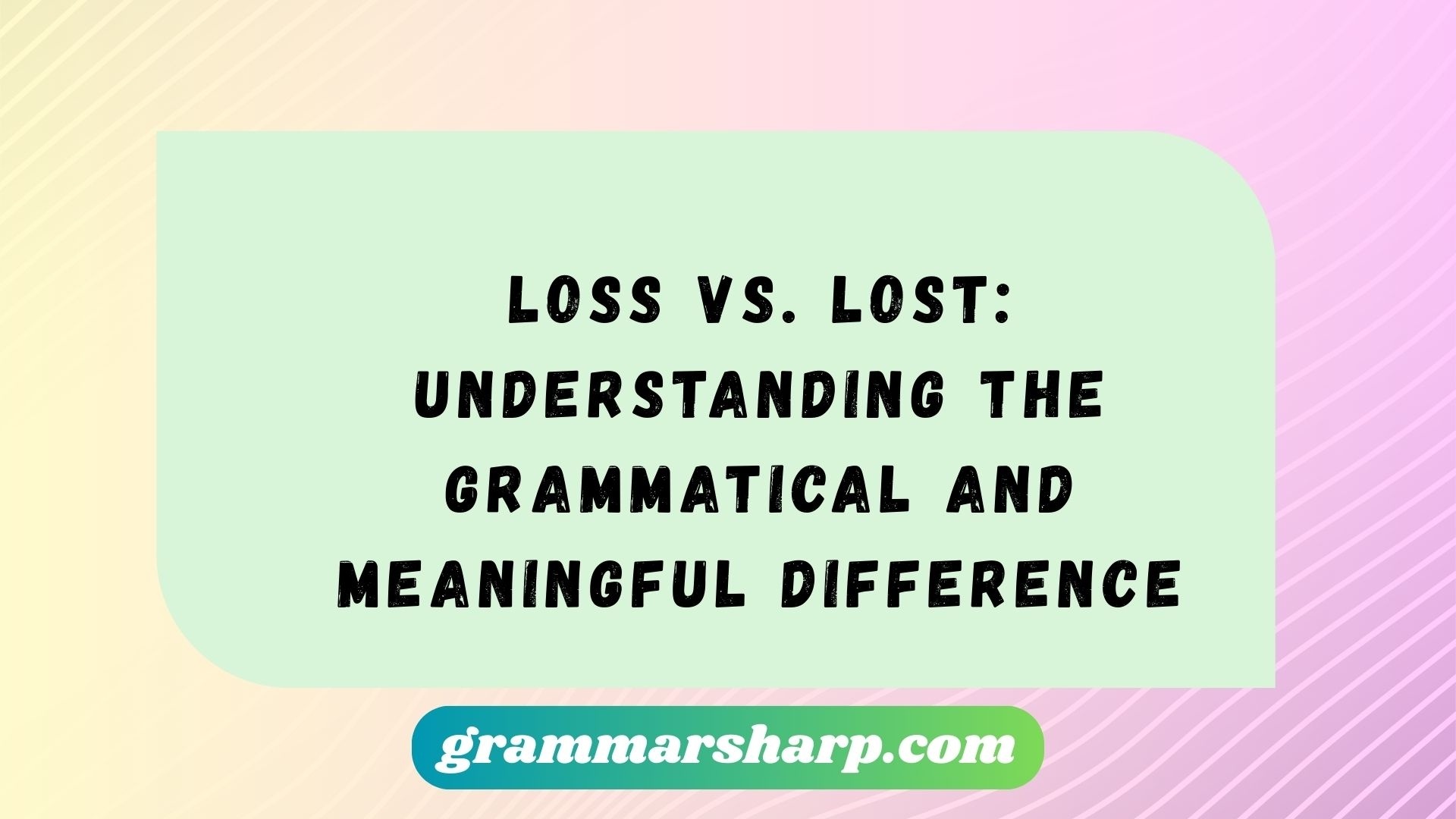Language can be tricky. Even native English speakers often pause when deciding whether to use loss or lost. Both words look and sound similar, and they’re related in meaning, but they play very different roles in grammar. Getting them mixed up can lead to awkward sentences, professional miscommunication, or even misunderstandings in personal contexts.
Think about it: you might say “I’m sorry for your loss,” but you would never say “I’m sorry for your lost.” On the other hand, “I lost my phone” makes perfect sense, while “I loss my phone” sounds completely wrong. That one-letter difference between “loss” and “lost” carries a huge grammatical weight.
In professional settings, such as business reports or academic papers, misusing these terms can reflect poorly on credibility. In personal writing, like heartfelt notes or even social media posts, using the wrong word can change the tone of your message.
This article dives deep into the grammatical, contextual, and meaningful differences between these two commonly confused words. You’ll learn their exact definitions, how to use them properly in different contexts, common mistakes to avoid, and even the idioms built around each one. By the end, you’ll never hesitate again when choosing between “loss” and “lost.”
The Core Difference Between Loss and Lost
At the simplest level, here’s what separates them
- Loss is a noun. It describes the state or fact of no longer having something.
- Lost is usually a verb (past tense of “lose”) or an adjective (describing something missing or gone).
Think of it this way:
- Loss = the thing that’s gone
- Lost = the act of losing or the state of being without
Quick examples
- “The company reported a loss of $2 million last quarter.”
- “She lost her keys yesterday.”
- “He feels lost after graduation.”
What Does “Loss” Mean?

Loss is always a noun. It refers to the state, fact, or instance of no longer possessing something. The word carries weight across many areas of life: business, sports, health, and emotions.
Common meanings of “loss”:
- Business and finance: A decrease in value, money, or profit.
- Personal or emotional: The death of someone close, or the end of something meaningful.
- Sports: When a team fails to win a game.
- General absence: The state of being deprived of something.
Example sentences
- “The sudden loss of a loved one can be devastating.”
- “The store recorded a loss in revenue due to fewer sales.”
- “The team suffered its first loss of the season.”
Key insight: Loss is about the condition or result, not the action.
What Does “Lost” Mean?
Unlike loss, the word lost can function in more than one way.
As a verb (past tense of “lose”):
- Indicates the action of no longer having something.
- Example: “I lost my phone yesterday.”
As an adjective:
- Describes a state of being without direction, confused, or unable to be found.
- Example: “He looked lost in the big city.”
Meanings of “lost”:
- Physical absence: Something misplaced or gone.
- Emotional state: Feeling directionless or confused.
- Failure: To be defeated in a contest or situation.
Example sentences:
- “She lost her favorite book.”
- “I felt completely lost after moving to a new country.”
- “Our team lost the championship game.”
Key insight: Lost describes the act or state of losing something.
Usage in Everyday Life
Both words show up often in daily conversations, writing, and professional contexts.
When to use loss:
- “I’m deeply sorry for your loss.”
- “The company is facing huge financial losses.”
- “The player accepted his team’s loss gracefully.”
When to use lost:
- “I lost my wallet on the bus.”
- “She feels lost after the breakup.”
- “The soldiers lost the battle despite their efforts.”
Grammar Rules Made Simple
Here’s a clear grammar breakdown:
| Word | Part of Speech | Meaning | Example Sentence |
| Loss | Noun | The fact or state of losing | “The loss of data was unexpected.” |
| Lost | Verb (past tense of lose) | Action of not winning or misplacing | “I lost the keys again.” |
| Lost | Adjective | Confused or missing | “He looked lost in thought.” |
Tips to remember:
- If you need a thing or condition, use loss.
- If you need an action or description, use lost.
Common Mistakes People Make
Because these words are so close, mistakes are common in both speech and writing.
Mistake examples:
- ❌ “I’m sorry for your lost.”
✔ “I’m sorry for your loss.” - ❌ “The company suffered a big lost.”
✔ “The company suffered a big loss.” - ❌ “I loss my phone.”
✔ “I lost my phone.”
Memory trick: Think of “loss” as the noun form of “lose.” “Lost” is the past tense.
Idioms and Expressions with Loss
Idioms add color to English, and loss appears in many fixed expressions:
- At a loss – unsure what to do.
- “I’m at a loss for words.”
- Cut your losses – stop doing something to avoid more damage.
- “We decided to cut our losses and cancel the project.”
- Profit and loss – financial measurement of gains and setbacks.
- “Every business tracks profit and loss.”
These idioms highlight how “loss” often connects to uncertainty, risk, or absence.
Idioms and Expressions with Lost
“Lost” also has a rich collection of idiomatic uses:
- Lost in thought – deeply focused or distracted.
- “She was lost in thought during the meeting.”
- All is lost – when hope seems gone.
- “He felt like all was lost after the failure.”
- Lost cause – a situation beyond saving.
- “Trying to fix that car is a lost cause.”
These expressions often carry strong emotions, from hopelessness to deep reflection.
Visual Guides for Quick Learners
Comparison Table
| Aspect | Loss (Noun) | Lost (Verb/Adjective) |
| Grammatical role | Noun | Verb (past tense) / Adjective |
| Main meaning | The state or instance of losing | The act of losing / being without |
| Example | “He suffered a loss.” | “She lost her purse.” |
Flowchart
Do you mean the state of losing something?
→ Yes → Use loss
→ No → Do you mean the action of losing or being without?
→ Yes → Use lost
Why Getting It Right Matters
Using loss vs. lost correctly isn’t just about grammar; it’s about communication clarity.
- Professional settings: In business reports, misusing these terms can confuse financial data. Saying “The company had a lost” instead of “The company had a loss” looks careless.
- Academic writing: Scholars and students risk losing credibility with basic errors.
- Personal communication: In sensitive moments like condolences, saying “sorry for your lost” can come across as insincere or careless.
Correct usage builds trust, professionalism, and empathy.
Conclusion
The confusion between loss vs. lost is common but avoidable. Remember:
- Loss is a noun – the condition of losing.
- Lost is a verb (past tense of “lose”) or an adjective – the action or state of being without.
A simple trick: If you can replace it with thing (noun), use loss. If you can replace it with gone/misplaced/confused, use lost.
Mastering the distinction sharpens your writing, polishes your speech, and ensures your words land exactly the way you intend.
FAQs
Is it “sorry for your loss” or “sorry for your lost”?
The correct phrase is “sorry for your loss.” It refers to the noun form meaning the absence of someone or something valuable.
Can “lost” ever be used as a noun?
No. “Lost” is either the past tense of “lose” or an adjective. It doesn’t function as a noun.
Is “at a loss” correct grammar?
Yes. “At a loss” is a fixed expression meaning puzzled, uncertain, or unsure.
How do I teach kids the difference between loss and lost?
Use simple examples: “loss = thing gone” vs. “lost = action or feeling.” Flashcards and real-life examples help.
Which is more formal: loss or lost?
Neither is more formal; it depends on context. “Loss” appears more in business, finance, and formal condolences. “Lost” is common in everyday speech.

